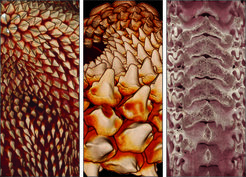Max Planck Institute of Colloids and Interfaces is participating in two Clusters of Excellence
In the Excellence Strategy research competition run by the German federal and state governments, the Clusters of Excellence have been approved: The Max Planck Institute of Colloids and Interfaces participates in two of the 7 selected Clusters of Excellence in the Berlin area

The Matters of Activity cluster, which was proposed by the Humboldt University Berlin, aims to establish the foundation for a new material culture. In this context, interdisciplinary research and development of sustainable processes and structures is a key priority in all areas of visual-material character, such as wearables, materials technology, medical technology, logistics, architecture, and robotics. The department of “Biomaterials” led by Prof. Peter Fratzl focuses on interdisciplinary research in the field of biological and biomimetic materials. The emphasis is on understanding how the mechanical or other physical properties are governed by structure and composition and how they adapt to environmental conditions. Furthermore, together with researchers in design and in the humanities, they will explore the possibilities of coding information within the structures of active material systems.
https://www.exzellenz.hu-berlin.de/en/clusters-of-excellence/matters-of-activity
The Cluster of Excellence “Unifying Systems in Catalysis (UniSysCat) - How to Understand and Utilize Networks in Catalysis”, headed by the Technical University Berlin, can build on ten years of outstanding work by UniCat, the previous cluster of the Excellence Initiative. Here the MPICI was already participating. Catalysis research is not only regarded as one of the most important research areas in chemistry, it is also the main driver of “green chemistry,” which focuses on sustainability and resource conservation. The challenge now is to decipher reaction networks in chemical and biological catalysis in space and time so that they can then be controlled, predicted and modified. Here two departments of the MPICI are involved. In the Colloid Chemistry department under the supervision of Markus Antonietti new photocatalysts are produced, which push the reactivity in previously inaccessible parts (for example, decomposition of toxic material). In a further project, following nature multiple reaction sequences are integrated at nanometer distances in order to make the reactions more effective and sustainable. Furthermore, the scientists of the Biomolecular Systems department of Peter H. Seeberger develop not only the fitting micro reactors, but also the in-situ („live“) analytics, which are able to closely monitor such joint reactions. With this new excellence cluster, the Berlin-Brandenburg region could initiate a new chemistry, which is very efficient in the use of resources and addresses the global problems of our time.
https://www.unisyscat.de/
Clusters of Excellence
The Excellence Commission, consisting of the members of the international Committee of Experts and the research ministers of the federal and state governments, approved 57 Clusters of Excellence to be funded from among the 88 proposed projects.
Clusters of Excellence will enable German university locations to establish internationally visible, competitive research and training facilities, thereby enhancing scientific networking and cooperation among the participating institutions. Clusters of Excellence should form an important part of a university's strategic and thematic planning, significantly raise its profile and reflect its considered long-term priorities.
A total of approximately €385 million are available annually for Clusters of Excellence. Final decisions will be made by the Excellence Commission on 27 September 2018. Funding will commence on 1 January 2019.












